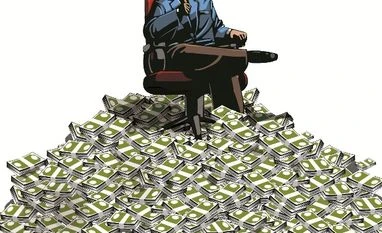Sitting at a table, grinding his pinkie into the corner of his mouth and staring at the screen, Dr Evil announces he is holding the world ransom for $1 million. Having been cryogenically frozen for 30 years, the comic villain created by the actor Mike Myers is shocked when he is told that $1 million isn’t a lot of money in 1997.
Trying to regain his composure, he turns to the screen, voice cracking with uncertainty, and says, “OK then, we hold the world ransom for $100 billion.”
Twenty years after the movie Austin Powers: International Man of Mystery was released, billions of dollars aren’t what they used to be, either.
Bill Gates alone is just $10 billion shy of Dr Evil’s ransom demand, according to a soon-to-be-released list of the world’s top 10 billionaires by Wealth-X, a financial research firm. Gates, the Microsoft founder, tops the list at $89.3 billion, followed by his friend Warren Buffett at $73.5 billion. The top 10 — nine from the United States, one from Spain — have a combined net worth of $582 billion. While their wealth would certainly be enough to save the world from Dr Evil, what they do with it in real life is the subject of great interest and debate.
That is true now more than ever. Issues around money — like wealth inequality and talk of tax cuts for the rich — are among the hottest topics of the day. And the richest president in history is sitting in the Oval Office, with billionaires sprinkled throughout his cabinet.
To some, today’s billionaires are like Dr Evil: selfish, rapacious and bent on world domination. To others, billionaires are worthy of respect for having put their names and fortunes behind an array of philanthropic endeavors, many aimed at improving the lives of people at the very base of the wealth pyramid.
There were 2,473 billionaires in the world, as of Wealth-X’s last count through 2015. That was a 6.4 per cent increase in billionaires from the year before. But who these billionaires are and what they’re like is more difficult to discern. Many may seem as ordinary as the guy sitting next to you on the train — or in Michael Bloomberg’s case, standing beside you on the subway, when he was mayor of New York. (Bloomberg is No 9 on Wealth-X’s list.)
There are certainly billionaires who want to save the world, like Gates, Buffett and Bloomberg, who have pledged to give their fortunes away. Others in the top 10 are also philanthropic, but they are still focusing on their day jobs, like Jeff Bezos of Amazon, Mark Zuckerberg of Facebook and Larry Page of Alphabet (the parent of Google) — Nos 4, 5 and 10.
Yet many of the billionaires beyond the top 10 or 20 have a much lower profile. Who outside of finance or hockey knew of Vincent Viola, a former oil trader and current owner of the Florida Panthers, before President Trump nominated him to be secretary of the Army? Now that he has withdrawn, he can return to relative anonymity.
For that matter, Wilbur L Ross, Trump’s choice for commerce secretary, is the wealthiest of the president’s billionaire cabinet picks. He would pop up in the headlines every few years for a deal he was making but then return to what could be called the quiet opulence of the billionaire class.
“We know that things are quite different for a billionaire individual or a billionaire family than they are for even a very wealthy ultra-high-net-worth family,” said Belinda Sneddon, national practice executive in the family office group at US Trust.
“They’re different in how they can invest their assets and what their portfolio may look like,” Sneddon said. “In many ways, they face different risks, both personal risks and cyber risks, than the average individual does. They often think about structuring decisions differently from a succession-planning standpoint as well as the structure they create around themselves and their family.”
Yet for most people, billionaires are just wealthy beyond belief. And these days, they are also much wealthier (and getting even more so) than the broader ultra-high-net-worth population.
That group is defined as anyone with more than $30 million. In 2015, there were 212,615 of them. On the lower end, the 155,050 people worth between $30 million and $99 million had a combined $8.4 trillion. At the top, the world’s 2,473 billionaires were worth $7.68 trillion.
“There is growing inequality around the world, but there is also inequality among the ultrawealthy,” said Maya Imberg, director of custom research at Wealth-X. Billionaires also matter because of the outsize influence they have, or believe they can have, on policy and public life. They can give millions to a political campaign, as Peter Thiel, a founder of PayPal and a director of Facebook, did with Trump, or as George Soros, the hedge fund manager and philanthropist, has done with liberal causes.
©2017 The New York Times News Service
Unlock 30+ premium stories daily hand-picked by our editors, across devices on browser and app.
Pick your 5 favourite companies, get a daily email with all news updates on them.
Full access to our intuitive epaper - clip, save, share articles from any device; newspaper archives from 2006.
Preferential invites to Business Standard events.
Curated newsletters on markets, personal finance, policy & politics, start-ups, technology, and more.
)